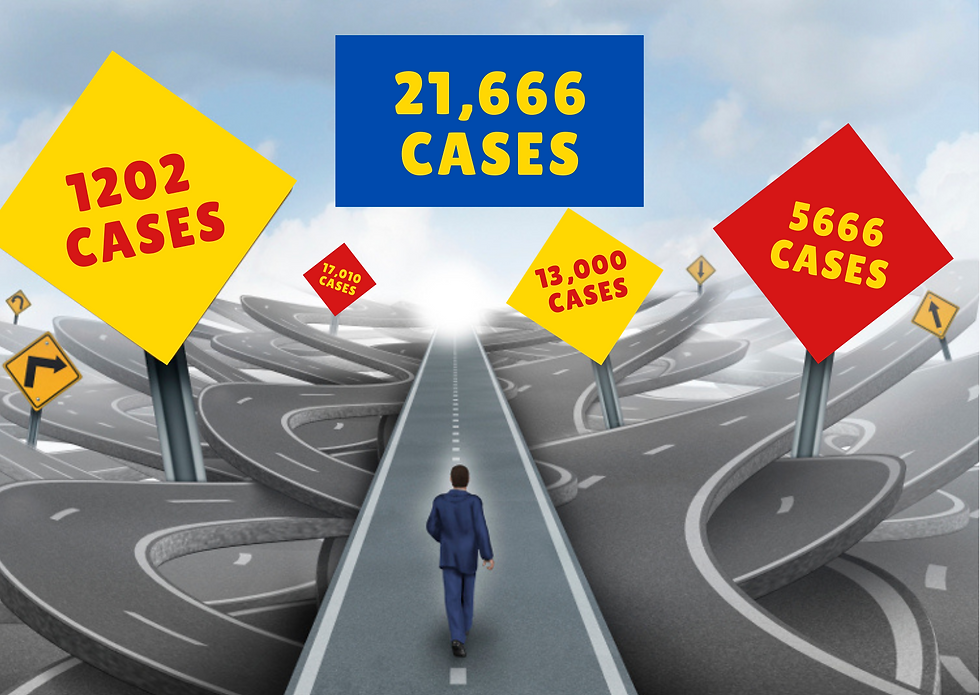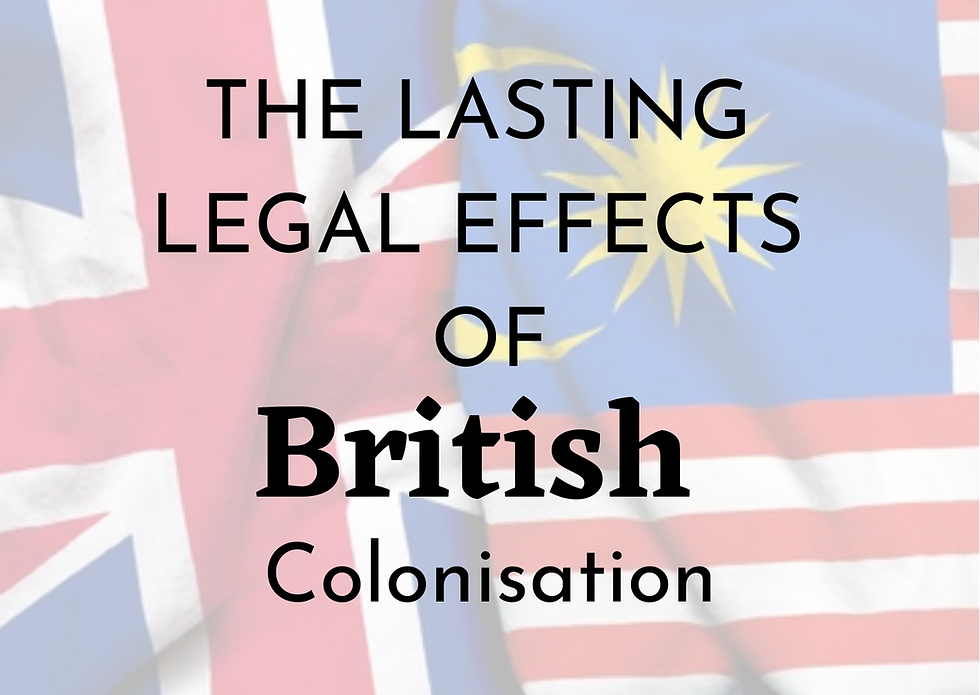Malaysia's Covid Conundrum: A Series of Unfortunate Events
- Lexicon Editorial Board

- Aug 14, 2021
- 7 min read

As of writing this article, there have been approximately 1,243,852 cases of Covid-19 in Malaysia, with daily cases numbering in the 20,000’s. Whilst that is certainly a high tally, mystifying in its depravity, it fails to lend context to the true extent of the situation. What is the case is that Malaysia ranks 27th in the world for the largest number of cases, and 12th in the world for daily increases of cases (as of 07/08/2021)[i]. Indeed, this is a far cry from the daily numbers but a month ago, being three times higher than prior.
The Year Malaysia Stood Still
A crucial question to be asked before diving into more divisive matters is simply, how did this all happen? To answer this question, a look at the timeline is necessary.
Initially, when Covid-19 first landed upon our nation’s shores, the procedures in place rapidly halted the virus’ path. A national lockdown was imposed (MCO 1), having the effect that, on the 1st of July 2020, Malaysia had recorded zero local transmissions[ii]. Seemingly, the powers that be had efficiently eradicated the threat. Little did we know, Malaysia was not yet out of the woods.
A key component within the equation is the (now infamous) Sabah elections, which took place in September 2020. Prior to this incident, the daily cases figure hovered around the hundreds. Unsurprisingly, after the holding of 257 rallies and 1.1 million voters attending the polling stations[iii], the daily case numbers sharply spiked. Researchers from the National University of Singapore have consequently found that the Sabah election contributed 70 percent of cases in the state itself and at least 64 percent in the rest of the country[iv]. Yet, whilst a dire incident of mismanagement, surely a lesson had been learnt? (Spoiler alert: It had not).
On the 6th of October 2020, Prime Minister Muhyiddin, in addressing the nation, declared that a repeat lockdown was not required, stating “we are now better prepared than before in terms of experience and manpower. We know the behaviour of the virus better and we have enough facilities and equipment”[v]. Nonetheless, this statement was in 2020, 2021 is a different year, and prior promises seem to hold no weight.
Suffice to say, on the 12th of January 2021, some 3 months post-Prime Minister Muhyiddin’s statement, a state of emergency was imposed, and the towering curtain of a national lockdown was again drawn (MCO 2). At this interval, the national tally surpassed 138,000 total cases, and the healthcare system was thinly stretched. However, unlike during MCO 1, the daily cases refused to fall, and on the 30th of January 2021, an all-time high of 5,728 daily cases was reached.
During the Holy Month of Ramadan however, the government, repeating its blunder, allowed Ramadan Bazaars to operate. The operation of Bazaars was premised on following strict SOP’s yet, as it may be obvious to many, what exactly those SOPs were, barring physical distancing, was not clear. Furthermore, it is a rather paradoxical proposition that one could even be physically distanced when in such premises. In due course, cases sharply raised, and these activities were quickly stopped yet, a case of too little too late? On June the 1st, a total lockdown took place, and such has continued, ineffectively, until today.
Malaysia is currently at a crossroads – with 20,000 daily cases and the healthcare system all but collapsed, rising unemployment and economic disaster looming, whatever Malaysia’s next action is, the future looks bleak.
One Controversy After the Other
In light of the worsening pandemic, it is perhaps, unfortunate that several controversies, be it political, social, or legal, have arisen as of late. A quick perusal of social media shows scores of disillusioned Malaysians criticising the current government’s actions. An example of such can be seen by the current ministers disregarding their own MCO restrictions. The Asia & Pacific Policy society[vi] cites an example whereby a minister visited a foreign country but failed to quarantine at home upon his return to Malaysia. He initially paid a fine, but after three months, was cleared of court charges by the Attorney General’s Chambers as he was not provided with a form to undergo quarantine. Such an incident was, sadly, not unique, and flies in the face of Malaysia’s common citizens, who themselves face fines upwards of RM10,000 on top of rapidly falling employment rates.
Other issues are also apparent, be it the unclear MCO measures which we are expected to abide by; the large sums of fines dished out seemingly upon a whim, or the cancellation of the Parliamentary sitting[vii]. Indeed, in connection to the above, there has been a slew of incidents that may lead one to question the government’s priorities. First, on the 3rd of August 2021, in the wake of the postponement of the special Dewan Rakyat sitting, opposition members of parliament gathered at Merdeka square and attempted to march 2km to parliament[viii]. Consequently, Federal Reserve Unit Officers, armed with riot shields, blocked their entrance and the police later indicated that they would summon the lawmakers for questioning.[ix] Politics aside, such is a powerful and visual statement of the current disarray plaguing the highest echelons of Malaysian power, and serves to show the rot festering within our ideal of the separation of powers. The executive quite literally ousting the legislature. Surely, with cases rocketing up the proverbial ladder, political hullabaloos are not what the doctor ordered.
Worse still, the growing degeneration of constitutional norms has spread, infecting various individuals who merely attempt to speak out. Indeed, it appears that the current government has, instead of tackling the current healthcare crisis forthwith, been targeting political naysayers. Sarah Irdina Mohammad Ariff, the founder of Misi Solidariti, was arrested and detained on the 29th of July 2021. The reason? A simple tweet. Subsequently, she was arrested pursuant to S4(1) of the Sedition Act 1948 which reads as follows:
“4. (1) Any person who –
(a) does or attempts to do, or makes any preparation to do, or conspires with any person to do, any act which has or which would, if done, have a seditious tendency;
(b) utters any seditious words;
(c) prints, publishes, sells, offers for sale, distributes or reproduces any seditious publication; or
(d) imports any seditious publication,
shall be guilty of an offence and shall, on conviction, be liable for a first offence to a fine not exceeding five thousand ringgit or to imprisonment for a term not exceeding three years or to both, and, for a subsequent offence, to imprisonment for a term not exceeding five years; and any seditious publication found in the possession of the person or used in evidence at his trial shall be forfeited and may be destroyed or otherwise disposed of as the court directs. (2) Any person who without lawful excuse has in his possession any seditious publication shall be guilty of an offence and shall, on conviction, be liable for a first offence to a fine not exceeding two thousand ringgit or to imprisonment for a term not exceeding eighteen months or to both, and, for a subsequent offence, to imprisonment for a term not exceeding three years, and the publication shall be forfeited and may be destroyed or otherwise disposed of as the court directs.”
As for the type of speech the law prohibits, the BBC explains that the law bans “any act, speech or publication that brings contempt against the government or Malaysia's nine royal sultans. It also prohibits people from inciting hatred between different races and religions, or questioning the special position of the ethnic Malay majority and the natives of Sabah and Sarawak.”[x] In short, this legislation was introduced by the British Colonial Government in order to combat the communist insurgency gripping our nation at the time. It’s a sad state of affairs that legislation, which was once used to combat an existential threat, is now used to imprison the outspoken and politically savvy. Indeed, the exceptionally wide definition does allow the police, or by extension the government to act as it did, silencing those who merely wish to exercise their right to speak. Such is notwithstanding Article 10 of our Federal Constitution.
A light at the end of the tunnel?
Whilst the contents of this article do connote certain systematic problems concerning the handling of the Covid-19 pandemic, it would be wrong to ignore certain achievements. As it currently stands, 36% of Malaysian adults are fully vaccinated (as of the 7th of August) and 66.4% of the adult population has received at least one jab.[xi] Further, the total number of jabs given has increased nearly 3 times from the amount as of July the 1st. Indeed, the rapid rate at which covid-19 vaccines have been administered is a source of much-needed welcome and sits at a much higher rate when compared to our regional counterparts. According to Oxford University's Our World in Data website:
“Malaysia's daily Covid-19 vaccine administered per 100 people in the population stood at 1.65 on Aug 2. The rate was significantly higher compared with other countries such as Singapore, which stood at 1.09 up to Aug 1, Turkey (0.98), Japan (0.77), South Korea (0.74), Canada (0.6), the European Union (0.52), the United Kingdom (0.31 up to Aug 1) and the United States (0.2).”[xii]
This rate will certainly increase in light of the new walk-in vaccination initiative for individuals, at this preliminary stage of implementation, aged 40 and above. Hopefully, this isn’t a case of too little too late.
Conclusion
The numerous and publicised issues of Malaysia’s Covid-19 response are of no shock to Malaysia’s general public. The ineffective measures, "rules for thee but not for me", and the political shenanigans frequently noted have lent credence to the idea that Malaysia’s response has been a resounding failure, plunging many into pits of desperation. Even so, the current vaccine drive is a source of desperately needed hope in the face of looming darkness.
"Sometimes life is like a dark tunnel. You can't always see the light at the end of the tunnel, but if you just keep moving... you will come to a better place." – Uncle Iroh, Avatar: The Last Airbender.
References
[i] https://www.worldometers.info/coronavirus/country/malaysia/
[ii] https://www.channelnewsasia.com/asia/timeline-how-covid-19-pandemic-has-unfolded-malaysia-january-2020-2082081
[iii] https://www.aljazeera.com/opinions/2021/8/3/malaysia-from-covid-role-model-to-a-mini-india
[iv] https://www.aljazeera.com/opinions/2021/8/3/malaysia-from-covid-role-model-to-a-mini-india
[v] https://www.scmp.com/week-asia/health-environment/article/3104421/coronavirus-malaysia-pm-blames-sabah-election-among
[vi] https://www.policyforum.net/malaysias-government-is-using-covid-19-to-consolidate-its-influence/
[vii] https://www.channelnewsasia.com/asia/malaysia-parliament-postponed-covid-19-cases-aug-2-2078351
[viii] https://www.aljazeera.com/news/2021/8/2/malaysia-deploys-riot-police-as-mps-attempt-march-to-parliament
[ix] https://www.channelnewsasia.com/asia/malaysia-opposition-dataran-merdeka-parliament-postponed-covid19-2084501
[x] https://www.bbc.com/news/world-asia-29373164
[xi] https://www.theedgemarkets.com/article/36-msian-adult-population-are-fully-vaccinated-against-covid19-aug-7
[xii] https://www.nst.com.my/news/nation/2021/08/714696/malaysia-tops-vaccination-rate



Comments